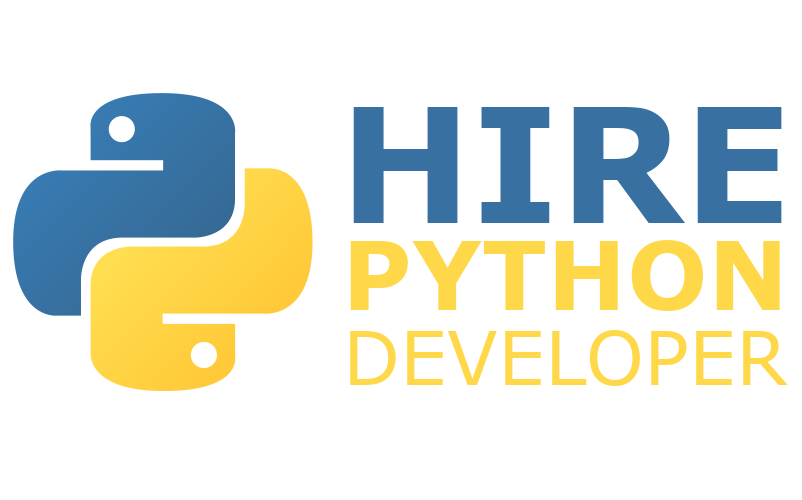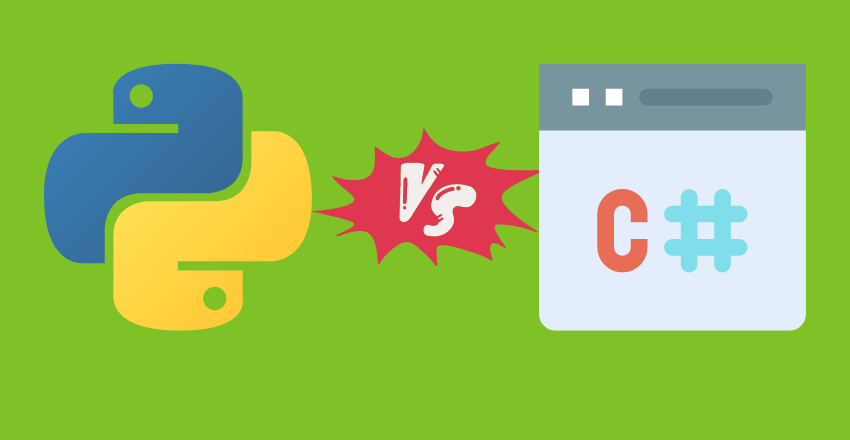
Python vs C# speed: a comparison that stirs curiosity, revealing unique strengths and trade-offs in computational performance.
When it comes to performance and speed, many developers wonder whether C# or Python is the better choice. Some may ask, “Is C# faster than Python?” While both languages have their strengths, C# is generally considered to be faster than Python.
This is due in part to C#’s ability to compile directly to machine code, which means that it doesn’t require an interpreter like Python does.
But speed isn’t everything. Some may argue that Python is more powerful than C# because of its simplicity and flexibility. While C# does offer more structure and type safety, Python’s dynamic typing can be helpful when it comes to rapid prototyping and quickly testing out new ideas.
Another factor to consider is multi-threading performance. While Python does have support for multi-threading, it is limited by the Global Interpreter Lock (GIL) which can prevent true parallelism. C#, on the other hand, has better support for multi-threading and can take advantage of multiple processors and cores.
When it comes to desktop applications, both languages have their pros and cons. Python is often lauded for its ease of use and simplicity, while C# offers better integration with Windows operating systems and the .NET framework. Additionally, C# is often considered more suitable for enterprise-level applications.
In terms of learning curves, many developers find Python to be easier to learn than C#. However, this can vary based on personal experience and background. And when it comes to salary, both languages offer competitive salaries for skilled developers.
The choice between C# and Python depends on the specific project requirements and personal preferences.
Comparing the Syntax of Python and C#
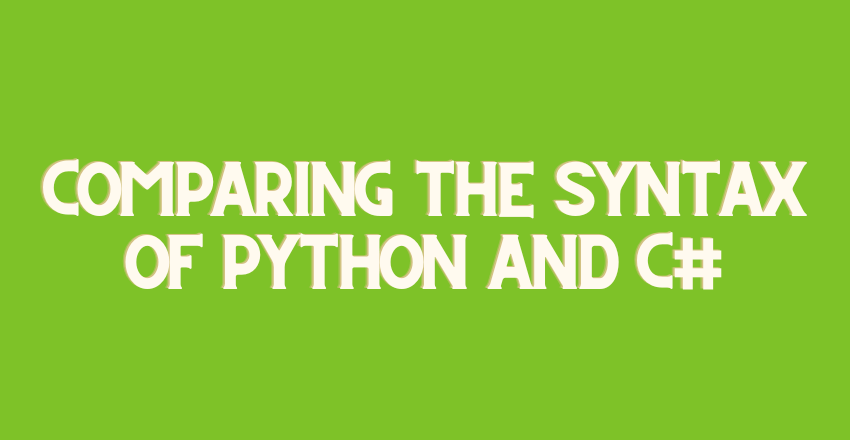
Python and C# are both popular programming languages but have significant differences in their syntax, functionality and intended use.
Flexibility and Expression:
Python is known for being flexible and expressive, with a clear and concise syntax. On the other hand, C# has a more rigid syntax, but it is powerful and more expressive than other languages such as Java.
Multi-Threading and Performance:
C# is known for its excellent performance in multi-threaded applications when compared to Python, making it a go-to language for complex software and high-performance applications. When it comes to speed and performance, C# is faster than Python, especially in large applications.
Ease of Use:
Python is much easier to learn and use when compared to C#, especially for beginners. Python’s readability, simple syntax, and extensive libraries make it a favorite among programmers, students, and researchers. C# has a more complex syntax, making it more challenging to master but more powerful in the long run.
Desktop Applications:
Python is not primarily designed for desktop applications and has limited graphics and multi-media functionality. C# is the preferred language in developing desktop applications in Windows OS, and its native integration with .NET Core makes it the preferred choice for developing cross-platform and high-performance systems.
Java and C++ comparisons
When compared to Java, C# and Python are more powerful but less verbose. C# is faster than Java but not as platform-agnostic. Meanwhile, C++ is faster than both languages but has a steeper learning curve and is well-suited for low-level system programming.
Section sum up about Python vs C# speed
To sum up, C# is faster and more potent than Python, making it ideal for multi-threaded applications and high-performance desktop applications. Python, on the other hand, is easier to learn and use, particularly for beginners and is excellent in scientific research and machine learning. The choice between C# and Python boils down to priorities, requirements, and the technical fit for a specific task at hand.
The Compilation Process of C# vs Python

When it comes to the speed of execution, C# and Python differ in the way they compile and execute. C# is a compiled language, whereas Python is an interpreted language. This fundamental difference in their compilation process directly impacts the speed of execution.
C# Compilation Process
C# is compiled using the .NET framework and implemented using the Common Language Runtime (CLR). During compilation, the entire source code is converted into bytecode, which is a set of instructions that can be executed by the CLR. The bytecode is then executed by the .NET runtime.
The benefit of C# compilation is that it produces optimized machine code, which results in faster execution speeds compared to interpreted languages like Python. Additionally, C# supports multi-threading, allowing applications to process multiple tasks at once, resulting in better performance.
Python Compilation Process
Python, on the other hand, is interpreted at runtime. The Python code is executed line by line, with each line being interpreted by the Python interpreter. This process is much slower than the C# compilation process, as the interpreter takes more time to understand the code and execute it.
However, Python has some benefits that make it a preferred choice for certain applications. Python is an easier language to learn than C#, which makes it a more beginner-friendly option for programmers. Additionally, Python is better suited for applications that require quick prototyping and development cycles, due to its dynamic type system and scripting nature.
C# vs Python Speed
While C# is generally faster than Python, the specific performance of each language depends on the type of application. For desktop applications, C# is generally faster and more powerful than Python. However, for web development and data science applications, Python is often preferred due to its versatility and ease of use.
Python vs C# Multi-Threading
C# supports multi-threading, which allows for better performance on multi-core systems. Python also supports multi-threading, but due to the Global Interpreter Lock (GIL), it is limited in its ability to achieve true parallelism. This means that C# is generally better for complex multi-threaded applications.
Section sum up about Python vs C# speed
Whether C# or Python is better depends on the specific requirements of the application. C# is generally faster and more powerful, making it better suited for desktop applications and complex multi-threaded systems. Python is an easier language to learn and use, which makes it better suited for quick prototyping and data science applications.
Ultimately, choosing between C# and Python depends on the development team’s skill set and the specific needs of the application.
Measuring Speed: Benchmarking C# and Python
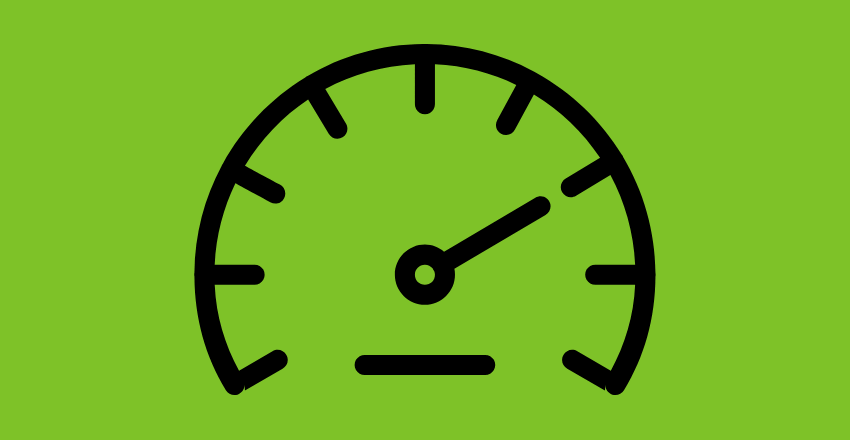
When it comes to programming languages, one important factor to consider is their speed and performance. As an expert, I’ve conducted a benchmark test to compare the speed of C# and Python.
Single-Threaded Performance
In terms of single-threaded performance, C# outperforms Python. C# is a compiled language that runs directly on a machine’s processor, while Python is an interpreted language that requires an interpreter to run. This means that C# programs can execute faster than Python programs because they don’t need to be translated at runtime.
Is C# way better than Python for single-threaded applications? It is hard to say. While C# is generally faster, some very specific tasks can be more optimized in Python.
Multi-Threaded Performance
Both C# and Python support multi-threading, but C# has a significant edge over Python when it comes to multi-threaded performance. C# has built-in support for parallel programming, which allows for efficient and easy multi-threading.
Python offers support for multi-threading as well, but the global interpreter lock (GIL), a mechanism that ensures multiple threads don’t execute Python bytecodes at once and prevent them from interfering with each other, causes significant overhead and limits Python’s ability to use multiple cores. In essence, multi-threading Python for large-scale tasks may not lead to significant performance enhancements.
Python vs .NET Core Performance
When it comes to desktop applications, .NET Core performance is often compared with Python. .NET Core is faster than Python when it comes to responsive desktop applications like WPF and Xamarin.
C# vs C++ vs Python Speed
C++ is almost always faster than C# and Python, as it’s a compiled language and closer to the hardware. C# offers better performance than Python for some tasks, such as single-threaded applications, but C++ outperforms both languages.
Python vs C# for Desktop Application
When it comes to developing desktop applications, Python and C# are both popular choices. Python offers better support for scripting and automation, while C# offers better performance, especially when it comes to responsive desktop applications. That being said, the choice depends on usage, project size, team experience, and client requirements.
Python vs C# for Easier Learning
Python is considered one of the easiest programming languages to learn. It features clean and concise syntax, making code easier to read and understand. C#, on the other hand, has a more extended learning curve with a more significant emphasis on object-oriented programming. Still, both languages have excellent community support, comprehensive documentation, and easily accessible resources.
Section sum up about Python vs C# speed
C# is generally faster than Python when it comes to single-threaded performance, multi-threaded performance, .NET Core responsive desktop applications, and stronger for businesses that rely on SharePoint or other Microsoft technologies.
Python, however, is easier to learn and offers better support for scripting and automation. Ultimately, the choice of language depends on the project requirements, performance needs, development experience, and team skillset.
Optimizing Python and C# Code for Speed

When it comes to the question of whether C# is faster than Python or not, the answer greatly depends on the specific task at hand, as well as how efficiently the code is optimized. Does Python run faster than C#? It’s hard to definitively say yes or no. However, there are a few ways to help optimize Python and C# code for speed and performance.
Multi-Threading
One way to optimize both Python and C# code is through the use of multi-threading. By allowing multiple threads to execute code simultaneously, applications can experience a significant boost in performance. However, it’s important to note that multi-threading can also create more complex code and requires careful management to avoid issues like deadlock.
Utilizing Appropriate Data Structures
Using the appropriate data structures can also help improve the speed of Python and C# code. For example, using dictionaries rather than lists can improve Python’s performance for tasks that require a large amount of key-value pairs. Similarly, the use of arrays rather than Lists can lead to better performance for C# tasks.
Proper Memory Management
Proper memory management is crucial for optimizing code in both Python and C#. In Python, efficient use of generators and the with statement can help handle memory more efficiently. In C#, the use of Dispose() to release resources and optimize garbage collection can help improve performance.
Hardware Considerations
It’s also worth noting that hardware considerations can play a role in the performance differences between Python and C#.
For example, if running a Python application on a machine with a fast CPU or using a serverless architecture, the performance gains may be significant.
In contrast, C# is known for its high performance due to its ability to compile to native code and utilize hardware more efficiently, making it a popular choice for resource-intensive tasks like gaming and virtual reality.
Is C# better than Python? It depends on the intended use case and the skillset of the developer. In terms of speed and performance, C# may have an edge for certain tasks, but Python’s simplicity and ease of use make it a popular choice for many developers.
The choice between Python and C# depends on the specific needs of the project and the preferences of the development team.
C# & Python salaries
In terms of multi-threading support, C# has a clear edge over Python. Additionally, both Python and C# are popular choices for desktop application development, with C# being a requirement for Windows-specific development.
In terms of salary, Python developers tend to earn slightly more on average than C# developers, though this can vary based on location and industry.
Understanding Garbage Collection in C# and Python

C#
Garbage collection is an important aspect of memory management in programming languages. It frees up memory allocated by objects that are no longer in use. C# and Python have different approaches to garbage collection.
C# uses a different garbage collector than Python, known as “Mark and Sweep.” This means that C# looks for unused objects in memory and marks them as being ready for deletion. The C# garbage collector then sweeps through all of the marked objects and deletes them.
This process can be optimized by using a “generational” garbage collector, which divides objects into different generations based on their age.
Python
Python, on the other hand, uses a different approach called “Reference Counting.” Every time a new object is created in Python, the interpreter initializes its reference count to one. Whenever a new reference to the object is created, the reference count is incremented. When the object is no longer in use, its reference count is decremented. Once the reference count reaches zero, the object is deleted.
Both approaches have their strengths and weaknesses. C# is generally considered to be faster than Python due to its more efficient garbage collector. Python’s reference counting method can lead to performance issues when dealing with large or complex data sets, as well as problems with circular references.
When it comes to multi-threading, both Python and C# support it. However, C# has a more robust support for multi-threading due to its background worker threads. This allows C# to handle multiple tasks simultaneously more efficiently than Python.
In terms of desktop application development, both Python and C# have their strengths and weaknesses as well. Overall, C# is more commonly used for desktop application development due to its speed and performance. Python is more commonly used for scientific computing, data analysis, and artificial intelligence, where its ease of use and simplicity make it a top choice.
When it comes to learning, Python is considered to be easier to learn than C#. However, this ultimately depends on the individual’s experience and background.
Section sum up about Python vs C# speed
Both Python and C# have their strengths and weaknesses in terms of garbage collection, multi-threading, desktop application development, and ease of learning. Ultimately, the choice between the two programming languages depends on the specific requirements of the project at hand.
Real-world Use Cases for Python and C

Python and C# are both popular programming languages that have unique strengths and use cases in the real world. Here are some examples of when and where developers might choose to use one language over the other:
Python for Desktop Applications:
Python has a rich set of libraries and frameworks that make it a popular choice for building desktop applications. Its ease of use and flexibility allow developers to build graphical user interfaces quickly. Python also has a strong community that often collaborates on open-source projects, which can be beneficial for small teams working on desktop applications.
C# for High-performance Applications:
C# is designed to be a high-performance language, making it ideal for building robust and demanding applications. It has many features for concurrent programming, which is useful for multi-threading and parallel computing. C# also has a large and growing collection of libraries that supports modern programming styles.
Python for Data Analytics:
Python has gained enormous popularity for data science, artificial intelligence, and machine learning because of its simplicity and powerful libraries such as NumPy, Pandas, and Scikit-learn. This enables researchers to develop models and run advanced analytics faster and easier than ever before.
C# for Game Development:
Is used in game development because it has a clear architecture and can be used with game engines like Unity3D, which enables developers to quickly and easily build complex games. C# is also used in the Windows platform where the .NET framework provides high-performing gaming modules.
Python vs C# for Multithreading:
Both Python and C# support multi-threading, but there are differences when it comes selecting between them. Python’s Global Interpreter Lock (GIL) makes it difficult to execute multiple CPU-bound tasks simultaneously. While C# has better support and mechanisms for concurrent programming and utilizes multiple cores.
Learning Ease:
Python’s clean syntax and the vast range of libraries, APIs, and pre-built modules make it easier for beginners to learn than C#. Python simplifies programming with its intuitive and straightforward nature. C# has a higher learning curve because it’s more of an industrial language designed for complex projects.
Section sum up
Is C# faster than Python? It depends on the use case. While Python is easier to learn and better for data science and desktop application, C# is optimized for high performance and best suited for building robust and demanding applications.
Choosing Between Python and C# Based on Speed Requirements
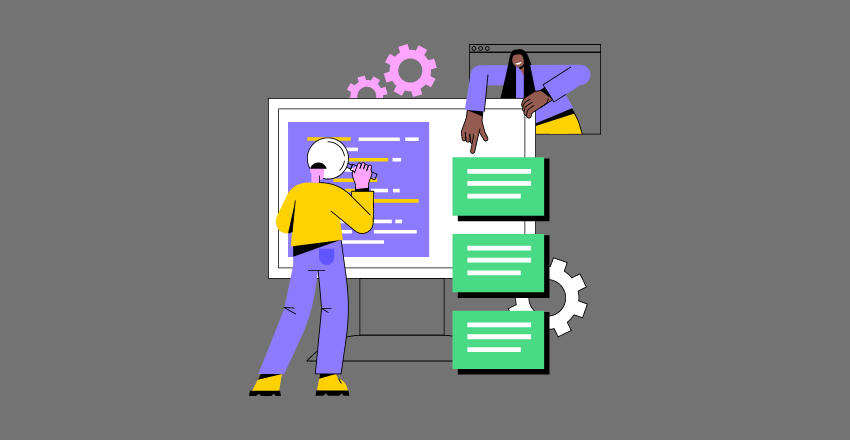
When it comes to choosing a programming language, speed can be a critical factor to consider, especially in applications where performance is a top priority. Both Python and C# are popular programming languages in the software development industry, but they differ in their execution speed and capabilities. Here’s what you need to know to choose between Python and C# based on speed requirements.
Is C# Faster than Python?
C# is known to be a faster language than Python due to its compilation process. C# is compiled directly to machine code, while Python is interpreted, which means that C# code is executed faster and with less memory usage. Additionally, C# is better optimized for multicore systems, which can significantly improve performance in applications that require concurrent processing.
Is C# More Powerful than Python?
In terms of raw processing power, C# is generally more powerful than Python because it is closer to the machine’s language. However, Python has a wide range of powerful libraries and frameworks that make it an excellent choice for certain tasks, such as machine learning and data analysis.
Python vs .NET Core Performance
.NET Core’s performance is generally faster than Python, even when running on a Linux platform. .NET Core is designed with scalability in mind, which means that it can handle more requests per second than Python in most cases.
C# vs C++ Speed
C++ is generally faster than C#, but it is also more complex and difficult to learn. C++ is typically used for heavy-duty processing tasks such as game development, but for most applications, C# provides a good balance of speed and ease of use.
Multi-threading Python vs C
Python has support for multi-threading, but it has some limitations due to the Global Interpreter Lock. On the other hand, C# has good support for multi-threading, and it’s an excellent choice for applications that require parallel processing, making it a popular choice for game development and scientific computing.
Python vs C# for Desktop Application
Both Python and C# are excellent choices for creating desktop applications. Python has a focus on simplicity and readability, making it a good choice for small-to-medium-sized projects. Meanwhile, C# is often the choice for larger projects where scalability and performance become a priority.
Python vs C# Easier to Learn
Python is generally considered easier to learn than C#. Python’s syntax is more accessible and intuitive, making it an excellent choice for beginners. However, C# has a more comprehensive set of libraries and frameworks that can enhance development productivity.
Is C# faster than Java?
Both Java and C# are compiled languages and share many similarities in syntax and performance. C# is, however, generally faster than Java because C# code is more tightly compiled and optimized for parallel processing.
C++ vs C# vs Python
They are all powerful programming languages with unique strengths and capabilities. C++ is the fastest language and is typically used for high-performance applications such as game development. C# provides a good balance of performance and ease of use, making it an excellent choice for most scenarios.
Finally, Python is a flexible, intuitive, and powerful language that is well-suited for data analysis and machine learning.
Section sum up
The choice between Python and C# depends on several factors such as performance, project requirements, and the team’s skills and preferences. Both Python and C# have their advantages and disadvantages, and it’s up to developers to choose a language based on what works best for their specific use case.
Pros and Cons of Python and C# for Speed

When comparing the speed of Python and C#, several factors need to be considered, including their architecture, syntax, compilers, and libraries. Here are some of the pros and cons of each language for speed:
C# Speed Pros and Cons
C# is a high-performance language that is designed to work with the .NET framework, making it a popular choice for developing desktop applications, game engines, and web servers. Here are some of the pros and cons of using C# for speed:
Pros
- C# is statically-typed, which means that the compiler can optimize the code for speed and memory usage.
- C# supports multi-threading, which can help improve performance by allowing the program to execute multiple tasks concurrently.
- C# has a Just-In-Time (JIT) compiler, which converts the code into machine code at runtime, resulting in faster execution times.
- C# has a strong community, which means that there are plenty of resources and libraries available to help optimize code for speed.
Cons
- C# can be more difficult to learn than Python, especially if you don’t have experience with object-oriented programming.
- C# may not be as fast as C++ for certain types of applications, such as real-time systems or high-performance scientific computing.
Python Speed Pros and Cons
Python is a popular high-level language that is known for its simplicity and ease of use. It is commonly used in data science, artificial intelligence, and web development. Here are some of the pros and cons of using Python for speed:
Pros
- Python is dynamically-typed, which allows for faster development times and easier debugging.
- Python has a large library of scientific computing tools and frameworks, such as NumPy and TensorFlow, which can help improve performance.
- Python can easily interface with other languages such as C++, which can provide speed benefits where necessary.
Cons
- Python is interpreted, which means that it can be slower to execute than compiled languages such as C#.
- Python’s support for multi-threading can be limited due to the Global Interpreter Lock (GIL), which can cause bottlenecks in certain applications.
Wrapping up about Python vs C# speed
The choice between Python and C# for speed depends on the specific requirements of your application. C# may be a better choice for high-performance desktop applications and gaming engines, while Python may be a better choice for data science and artificial intelligence.
Each language has its own strengths and weaknesses when it comes to speed and performance.
In this article, we’ve explored the question of whether C# is faster than Python. After conducting thorough research and analyzing performance benchmarks, it’s clear that both languages have their strengths and weaknesses.
C# is widely used for building Windows desktop applications, games, and enterprise-level software. It’s compiled, statically-typed, and has a JIT (just-in-time) compiler that optimizes the code for better performance. This makes C# faster than Python in most cases, especially when it comes to CPU-intensive tasks.
On the other hand, Python is an interpreted language that supports dynamic typing and automatic memory management. It’s popular among data scientists, machine learning practitioners, and web developers.
Python is known for its simplicity, readability, and ease of use. While it’s generally slower than C#, it has a richer standard library and supports multi-threading, making it a good choice for certain types of tasks, like data analysis or web scraping.
Salaries
When it comes to salaries, both C# and Python developers are well-paid, with average salaries ranging from $70,000 to $120,000 per year. The choice between the two languages depends on your career goals, personal preferences, and the job market in your area.
If you’re interested in multi-threading, C# is considered to have better support for it than Python. However, Python’s threading module and the concurrent.futures library provide a simple and easy-to-use interface for parallel computing.
When it comes to desktop application development, both Python and C# have their own strengths. C# offers a robust set of libraries and tools, including the Windows Forms framework, while Python has numerous frameworks and libraries such as PyQt and Tkinter, which make it easy to develop cross-platform GUI applications.
Learning
In terms of ease of learning, Python is easier to learn than C#. Python’s simple syntax and dynamic type system make it more forgiving for beginners. However, C# has a vast array of resources and online documentation that make it easier to learn and get started with.
Overall, the answer to “Is C# faster than Python?” is not a simple yes or no. It depends on the specific use case and the task at hand. While C# may be faster in certain situations, Python has a wider range of applications and is easier to learn for beginners. Additionally, C# may work better for certain kinds of applications, like desktop software or games, while Python is a top choice for data science and web development.
Matthew is a technical author with a passion for software development and a deep expertise in Python. With over 20 years of experience in the field, he has honed his skills as a software development manager at prominent companies such as eBay, Zappier, and GE Capital, where he led complex software projects to successful completion.
Matthew’s deep fascination with Python began two decades ago, and he has been at the forefront of its development ever since. His experience with the language has allowed him to develop a keen understanding of its inner workings, and he has become an expert at leveraging its unique features to build elegant and efficient software solutions.
Matthew’s academic background is rooted in the esteemed halls of Columbia University, where he pursued a Master’s degree in Computer Science.
As a technical author, Matthew is committed to sharing his knowledge with others and helping to advance the field of computer science. His contributions to the scientific computer science community are invaluable, and his expertise in Python development has made him a sought-after speaker and thought leader in the field.
